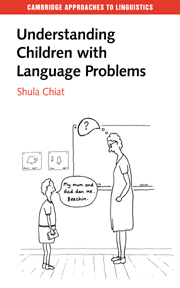Book contents
- Frontmatter
- Contents
- Acknowledgements
- Glossary of text conventions and symbols
- Introduction
- Part I Problems with words
- Part II Grappling with verb structure
- 7 Translating events
- 8 Growing verb structures
- 9 Shortfalls with verbs
- 10 ‘Thing out. Tip in there’: problems with verb processing
- Part III Missing function morphemes
- Part IV Hidden meanings, baffling meanings
- Endpoint and springboard
- Further reading
- References
- Index
8 - Growing verb structures
Published online by Cambridge University Press: 05 September 2012
- Frontmatter
- Contents
- Acknowledgements
- Glossary of text conventions and symbols
- Introduction
- Part I Problems with words
- Part II Grappling with verb structure
- 7 Translating events
- 8 Growing verb structures
- 9 Shortfalls with verbs
- 10 ‘Thing out. Tip in there’: problems with verb processing
- Part III Missing function morphemes
- Part IV Hidden meanings, baffling meanings
- Endpoint and springboard
- Further reading
- References
- Index
Summary
Children set out with two sources of information about sentences: the scenes which they observe and participate in, and the sound of the utterances they hear. We have just seen that the connection between scene and sound is an indirect one. The sound consists of word forms organised in a rhythmic structure, and this relates to a particular event involving particular participants. In discovering sentences, children must somehow discover which components of the sound relate to which aspects of the scene. This means identifying verb forms and the particular events which map onto those forms. It also means identifying the way arguments are organised around the verb and the event roles which map onto those arguments.
Most children appear to meet the challenges posed by language with ease and speed. By 16 months, they will often respond appropriately to requests such as
Give Jane the cookie
Show Jane the cookie
suggesting that they understand the verb and the roles of the arguments (Huttenlocher 1974). This is backed up by evidence of what they do when they are given peculiar requests which they are highly unlikely to have heard before, and which therefore call for active interpretation of the verb and argument roles:
Smell the dolly
Kiss the truck
Presented with bizarre instructions of this sort, children of 16–24 months carry out a fair proportion correctly (Sachs & Truswell 1978). Where they do, they have clearly understood the verb and the role of its object. Whether they have also understood the importance of word order is a moot point.
- Type
- Chapter
- Information
- Understanding Children with Language Problems , pp. 127 - 143Publisher: Cambridge University PressPrint publication year: 2000

